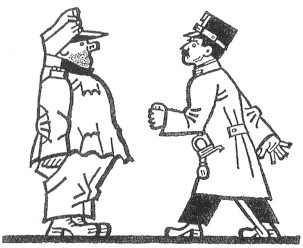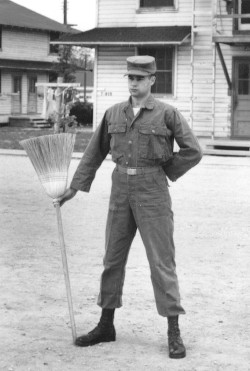The Good Soldier Švejk
Today, an old, but very sound, book on corporate management. The University of Houston's College of Engineering presents this series about the machines that make our civilization run, and the people whose ingenuity created them.
Winter, 1974: I arrived at the Serbian Orthodox Cathedral in Belgrade, Jugoslavija, covered with snow. I was singing there with the Patriarch's Oktet, and I'd made it to the service despite a blizzard. One old singer, seeing I'd come miles in bad weather, nodded and said to me, Dobri Vojnik! Serbian for Good Soldier. The Slavic term Dobri Vojnik is seldom uttered seriously. It suggests one who is slavishly, and somewhat foolishly, devoted to duty.
The term Dobri Vojnik went international in 1921. That year a radical Czech named Jaroslav Haek wrote a book which became an instant classic -- a WW-I novel titled The Good Soldier Švejk. Hašek's masterpiece tells of the innocent Švejk, Mr. Everyman, haled into the army on the side of the Germans.
Švejk is a totally cooperative soldier -- filled with aggressive enthusiasm. He obeys all orders just as they're issued, completely and without question. Of course no army can exist when its troops do that. Švejk just about brings the army to its knees.
Švejk is not the only such literary hero. Herman Melville's hero Billy Budd, (made into a wonderful operatic figure by Benjamin Britten) is a sailor who radiates good-hearted cooperation. In the end, the British Navy instinctively responds to Budd by destroying him.
Švejk, on the other hand, knows perfectly well what a destructive force his obedience is, and he wields it like a scalpel. In that, he echoes the Taoist philosophy of "yield and overcome." He knows perfectly well that you destroy your enemy by cooperating.
It was obvious to me during my two years as an enlisted man that the Army absolutely depends on people who disobey orders. No authoritarian organization can avoid issuing orders that're muddled and self-defeating. Armies depend on people who say No to authority. When soldiers fail to do so, the result may be simple confusion; it may be a major atrocity. God help any lieutenant whose NCOs haven't the wits to cover his blunders by disobeying. The old MASH series on TV played that theme with stinging accuracy.
Think for a moment what it means to issue an order. It is to specify an outcome, to predict a future. But modern science makes it crystal clear that the future cannot be predicted. Tiny imperfections in an initial state of affairs always magnify in time. That's why we can't predict weather in the long term. That's why we can't predict our own futures. And that's why any commander had better hope his subordinates have the wits and courage to disobey.
Yet organizations tell their people to pull together, embrace corporate goals, and support common themes. Organizations routinely perish because of that. Hierarchical systems are doomed without disobedient and dissident members. So read The Good Soldier Švejk as you try to shape your organization. To survive, it must run on the creative, out-of-step individualism of its members. Disobedience is the primary survival trait of any organization.
I'm John Lienhard, at the University of Houston, where we're interested in the way inventive minds work.
(Theme music)
Hašek, J., The Good Soldier Švejk and His Fortunes in the World War (tr. Cecil Parrott). New York: Thomas Y. Cromwell Co., 1974.
Throughout this episode, I have used the customary Slavic letter j to represent the English sound y. Švejk, for example is often represented in English or German as Schweik. The letter š is pro-nounced as sh.

From Osudy dobrého vojaka Švejka za svêtové války, 1921

The author as obedient soldier, Ft. Monmouth, 1954